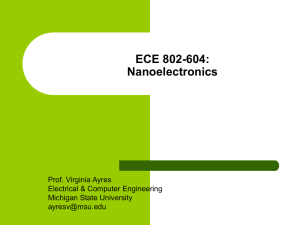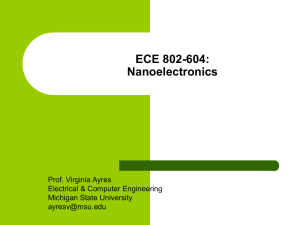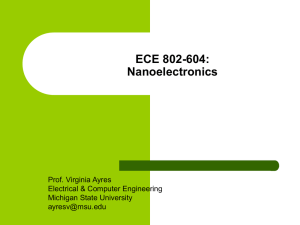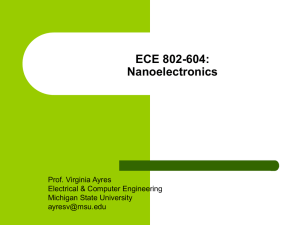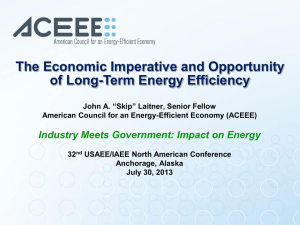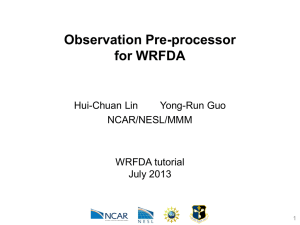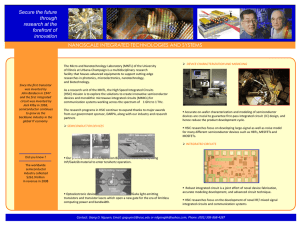Lecture 04 10 Sep 13 - Michigan State University
advertisement
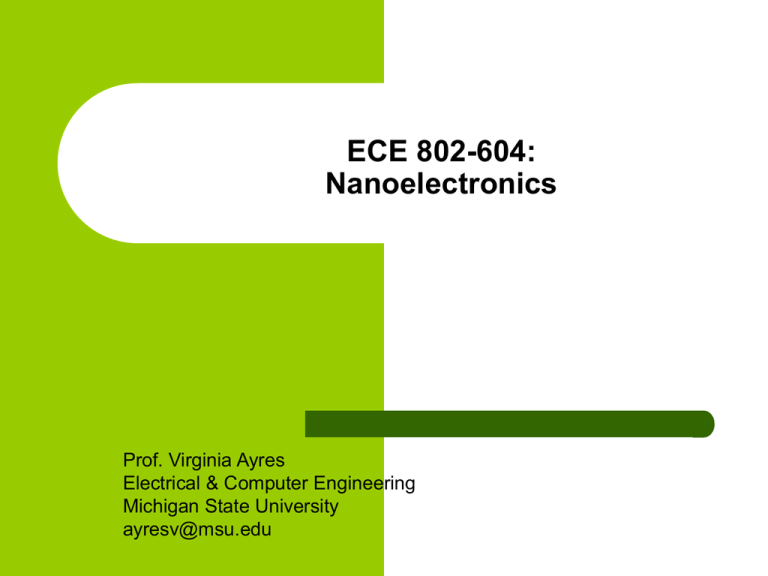
ECE 802-604: Nanoelectronics Prof. Virginia Ayres Electrical & Computer Engineering Michigan State University ayresv@msu.edu Lecture 04, 10 Sep 13 In Chapter 01 in Datta: Two dimensional electron gas (2-DEG) DEG goes down, mobility goes up Define mobility Proportional to momentum relaxation time tm Count carriers nS available for current – Pr. 1.3 (1-DEG) How nS influences scattering in unexpected ways – Pr 1.1 (2-DEG) One dimensional electron gas (1-DEG) Special Schrödinger eqn (Con E) that accommodates: Electronic confinement: band bending due to space charge Useful external B-field Experimental measure for mobility VM Ayres, ECE802-604, F13 Lecture 04, 10 Sep 13 In Chapter 01 in Datta: Two dimensional electron gas (2-DEG) DEG goes down, mobility goes up Define mobility m Proportional to momentum relaxation time tm Count carriers nS available for current – Pr. 1.3 (1-DEG) How nS influences scattering in unexpected ways – Pr 1.1 (2-DEG) One dimensional electron gas (1-DEG) Special Schrödinger eqn (Con E) that accommodates: Electronic confinement: band bending due to space charge Useful external B-field Experimental measure for mobility VM Ayres, ECE802-604, F13 Wire up HEMT to use the triangular quantum well region in GaAs -z y Ey nx = (-|e |)(-|E y|) y z Correct for e-’s with Drain = + Note: current I is IDS VM Ayres, ECE802-604, F13 Why do this: increase in Mobility in using 2-DEG region in GaAs instead of 3-DEG bulk GaAs mobility 931C: 3D Scattering Sweet spot at 300K T = cold: Impurity = ND+, NAscattering T = hot: Phonon lattice scattering VM Ayres, ECE802-604, F13 Increase in Mobility is based on decrease of scattering, or said another way, increase e-s not scattered. Scattering involves energy and momentum conserving interactions. Putting quantum restrictions on these interactions means that fewer can occur. VM Ayres, ECE802-604, F13 Streetman t: Datta tm t: The statement below is true for a group of e-s not a single scattering event. tm is an average or mean time VM Ayres, ECE802-604, F13 Lecture 04, 10 Sep 13 In Chapter 01 in Datta: Two dimensional electron gas (2-DEG) DEG goes down, mobility goes up Define mobility m Proportional to momentum relaxation time tm Count carriers nS available for current – Pr. 1.3 (1-DEG) How nS influences scattering in unexpected ways – Pr 1.1 (2-DEG) One dimensional electron gas (1-DEG) Special Schrödinger eqn (Con E) that accommodates: Electronic confinement: band bending due to space charge Useful external B-field Experimental measure for mobility VM Ayres, ECE802-604, F13 2-DEG: Major improvement in performance at low temperatures mobility 931C: 3D Scattering Sweet spot at 300K T = cold: Impurity = ND+, NAscattering T = hot: Phonon lattice scattering VM Ayres, ECE802-604, F13 2-DEG: large increase in carrier concentration nS: intrinisic VM Ayres, ECE802-604, F13 2-DEG: large increase in carrier concentration nS: intrinisic 3-DEG VM Ayres, ECE802-604, F13 2-DEG: Energy: Special Schrödinger eqn (Con E) that accommodates: Electronic confinement: band bending due to space charge Useful external B-field Example: ECE874, Pr. 3.5 with E-field: determine direction of motion. Datta 1.2.1 would be correct way to continue the problem to get energy levels VM Ayres, ECE802-604, F13 2-DEG: Energy: 2-DEG wavefunction Use this wave function in the special Schroedinger eq’n and it will separate into kz and kx, ky parts. kz is a fixed quantized number(s). kx, ky are continuous numbers VM Ayres, ECE802-604, F13 2-DEG: Energy: For the kx, ky part: VM Ayres, ECE802-604, F13 Bulk Dimensionality Systems: 3-DEG z KE = px2 + py2 + pz2 2m* 2m* 2m* y Free motion in all directions x px , py , pz can take any values Macroscopic World Bulk Materials Silicon Ingot B. Jacobs, PhD thesis VM Ayres, ECE802-604, F13 Reduced Dimensionality Systems: 2-DEG KE z E= px2 + py2 + nz2 ħ2p2 2m* 2m* 2m*Lz2 y x Free motion in x and y directions Shown: Infinite potential well in z direction Graphene pz is constrained to be a number(s) Thin Films Thin layers J.S. Moodera, Francis Bitter Magnet Lab, MIT A.K. Geim and K.S. Novoselov, Nat. Mater., 2007, 6, 183 B. Jacobs, PhD thesis VM Ayres, ECE802-604, F13 Reduced Dimensionality Systems: 1-DEG KE z E= nx2 ħ2p2 + py2 + nz2 ħ2p2 2m*Lx2 2m* 2m*Lz2 y x Free motion in y direction Shown: Infinite potential well in x and z directions px , pz are constrained to be a number(s) Carbon Nanotubes, Nanowires, Molecular Electronics 1μm Richard E. Smalley Institute, Rice University B. Jacobs, PhD thesis VM Ayres, ECE802-604, F13 Reduced Dimensionality Systems: 0-DEG E= z x y nx2 ħ2p2 + ny2 ħ2p2 + nz2 ħ2p2 2m*Lx2 2m*Ly2 2m*Lz2 No free motion. Enter and leave QD by tunnelling Shown: Infinite potential well in x, y and z directions px, py, pz are constrained to be a number(s) Quantum Dots A. Kadavanich, MRSCE, University of Wisconsin B. Jacobs, PhD thesis VM Ayres, ECE802-604, F13 2-DEG in a semiconductor: KE VM Ayres, ECE802-604, F13 2-DEG in a semiconductor: VM Ayres, ECE802-604, F13 2-DEG in a semiconductor: You have put integral travelling waves in a large box but are ignoring the edges VM Ayres, ECE802-604, F13 2-DEG in a semiconductor: Standing waves in a small box. Edges matter. VM Ayres, ECE802-604, F13 2-DEG in a semiconductor: VM Ayres, ECE802-604, F13 2-DEG in a semiconductor: S ES is the minimum energy required for an e- to be out of a bond. VM Ayres, ECE802-604, F13 2-DEG in a semiconductor: Similar to: e1 EC = Egap ES is the minimum energy required for an e- to be out of a bond. VM Ayres, ECE802-604, F13 2-DEG in a semiconductor: e1 VM Ayres, ECE802-604, F13 2-DEG in a semiconductor: e1 kx Any little patch on there would have some values of kx, ky VM Ayres, ECE802-604, F13 2-DEG in a semiconductor: e1 kx y-axis is E. The bowl is the KE that an e- has above the minimum requirement of ES required to be out of a bond p = hbar k and KE = p2/ 2m VM Ayres, ECE802-604, F13 Reduced Dimensionality Systems: 2-DEG KE: write p in terms of hbar k z E= px2 + py2 + nz2 ħ2p2 2m* 2m* 2m*Lz2 y x Free motion in x and y directions Shown: Infinite potential well in z direction Graphene pz is constrained to be a number(s) Thin Films Thin layers J.S. Moodera, Francis Bitter Magnet Lab, MIT A.K. Geim and K.S. Novoselov, Nat. Mater., 2007, 6, 183 VM Ayres, ECE802-604, F13 Go back to this idea: You have put integral travelling waves in a large box but are ignoring the edges VM Ayres, ECE802-604, F13 Combine with this idea: e1 kx y-axis is E. The bowl is the KE that an e- has above the minimum requirement of ES required to be out of a bond p = hbar k and KE = p2/ 2m VM Ayres, ECE802-604, F13 Count the number of available energy levels in a 2-DEG conduction band: NT(E) VM Ayres, ECE802-604, F13 2-DEG in a semiconductor: NT(E) VM Ayres, ECE802-604, F13 2-DEG in a semiconductor : NT(E) VM Ayres, ECE802-604, F13 2-DEG in a semiconductor: NT(E) VM Ayres, ECE802-604, F13 2-DEG in a semiconductor: NT(E) VM Ayres, ECE802-604, F13 2-DEG in a semiconductor : NT(E) VM Ayres, ECE802-604, F13 2-DEG in a semiconductor : NT(E) VM Ayres, ECE802-604, F13 2-DEG in a semiconductor: NT(E) VM Ayres, ECE802-604, F13 Use NT(E) to get energy density of states N(E): VM Ayres, ECE802-604, F13 Your Homework Pr 1.3: 1 Deg in a semiconductor: VM Ayres, ECE802-604, F13 Your Homework Pr 1.3: 1 Deg in a semiconductor: VM Ayres, ECE802-604, F13 VM Ayres, ECE802-604, F13 Use N(E) to get concentration nS VM Ayres, ECE802-604, F13 Use N(E) to get concentration nS VM Ayres, ECE802-604, F13 VM Ayres, ECE802-604, F13 Fermi wavenumber kf: VM Ayres, ECE802-604, F13 Corresponding Fermi velocityr vf: VM Ayres, ECE802-604, F13 Characteristic mean free path length Lm: VM Ayres, ECE802-604, F13 Lecture 04, 10 Sep 13 In Chapter 01 in Datta: Two dimensional electron gas (2-DEG) DEG goes down, mobility goes up Define mobility Proportional to momentum relaxation time tm Count carriers nS available for current – Pr. 1.3 (1-DEG) How nS influences scattering in unexpected ways – Pr 1.1 (2-DEG) One dimensional electron gas (1-DEG) Special Schrödinger eqn (Con E) that accommodates: Electronic confinement: band bending due to space charge Useful external B-field Experimental measure for mobility VM Ayres, ECE802-604, F13
